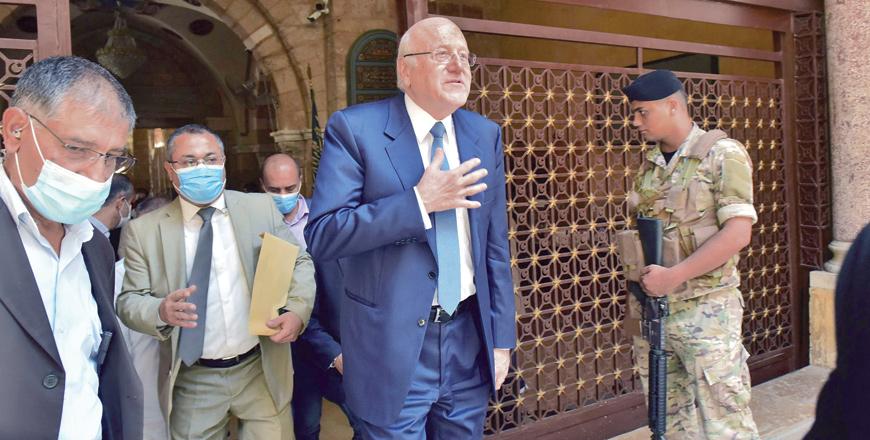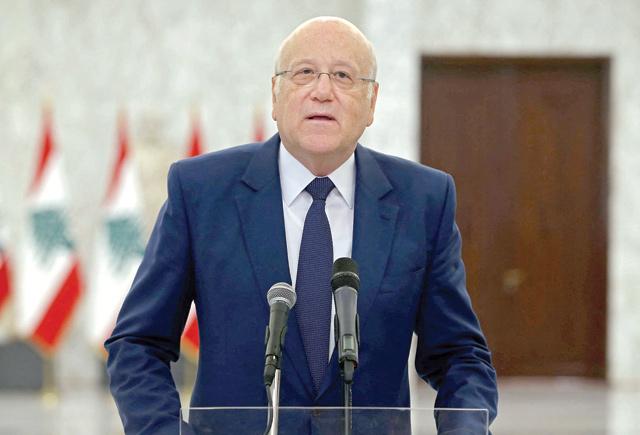You are here
Crisis-hit Lebanon gets Cabinet after 13-month wait
By AFP - Sep 11,2021 - Last updated at Sep 11,2021

Prime Minister-designate Najib Mikati leaves Al Omari Mosque in the Lebanese capital Beirut on Friday, ahead of meeting with the Lebanese president (AFP photo)
BEIRUT — Lebanese commentators voiced scepticism Saturday over the bankrupt state's ability to win back the support of foreign donors after political factions finally agreed a new government following 13 months of horse-trading.
Najib Mikati, who has served as prime minister twice before, on Friday unveiled his team of newcomers, some technocrats but all endorsed by at least one of the political parties dominant since the 1975-1990 civil war.
The 24-member Cabinet, which includes a single woman, faces the daunting task of carrying out reforms demanded by the international community to unlock desperately needed financial aid.
But many Lebanese questioned whether the new team was up to the task, or would be able to bring forward the demands of a 2019 protest movement for an end to alleged mismanagement and corruption.
"There is no confidence in Naji Mikati's government, which represents the interests of a system that engineered the country's collapse," wrote the Al Akbar newspaper, which is close to powerful Shiite movement Hizbollah.
The new government comes as Lebanon is mired in what the World Bank has described as one of the world's worst economic crises since the 1850s.
The overwhelming majority of Lebanese struggle to survive amid soaring inflation, fuel and medicine shortages and almost round-the-clock power cuts.
A huge swathe of the population has sunken into poverty, while thousands of the better off have left the country for new lives abroad.
French-language newspaper L'Orient — Le Jour questioned the naming of "an old-school Cabinet to tackle a herculean task".
Mikati was the third person asked to try to form a new government after the previous one resigned following a massive explosion of ammonium nitrate fertiliser at Beirut port last summer that killed at least 214 people.
It emerged afterwards that officials had known the highly explosive material had been lingering unsafely on the dockside for years, but had done nothing about it.
'Political sterility'
Activists on social media slammed the new cabinet as representing the same people they hold responsible for the blast.
One user described it as yet another product of "the nitrate regime, political sterility and corruption".
Lebanese political analyst Sami Nader said he doubted the new ministers' ability to lead the country forward as they had been approved by the "same cooks".
He said he feared a continuation of the same "quota politics and bickering over every reform" that had dogged the previous cabinet.
In an emotional speech on Friday, Mikati vowed to leave no stone unturned in his quest to save the Mediterranean country.
But many see the business tycoon, who is reputed to be Lebanon's wealthiest man, as a product of a corrupt oligarchy. He was accused by a state prosecutor in 2019 of illicit enrichment, a charge he denies.
The new government includes some fresh faces.
Among them is new health minister Firass Abiad, the head of Lebanon's largest public hospital, who rose to prominence for his role in tackling the COVID-19 pandemic.
Academic Nasser Yassin is to lead the environment ministry.
But critics are doubtful new finance minister Youssef Khalil, a veteran of the central bank, is the best man to relaunch stalled talks with the International Monetary Fund to rescue the economy.
They say he is unlikely to take a tough stance against his former employer, whom many accuse of being behind the current financial meltdown.
The United States and the European Union have both urged the new government to undertake reforms quickly, with Washington calling on Mikati to address "the dire needs and legitimate aspirations of the Lebanese people".
UN chief Antonio Guterres said a new cabinet was a "very important step" but "not enough" as "there are many other things to be solved".
Related Articles
BEIRUT — Lebanon's lawmakers designated incumbent Prime Minister Najib Mikati to form a new government on Thursday, more than a month after
BEIRUT — Lebanese lawmakers on Monday tasked ex-premier and billionaire Najib Mikati with forming a government and ending one year of politi
BEIRUT — Lebanon's new prime minister-designate Najib Mikati on Tuesday held consultations with political parties that he said "unanimously"














